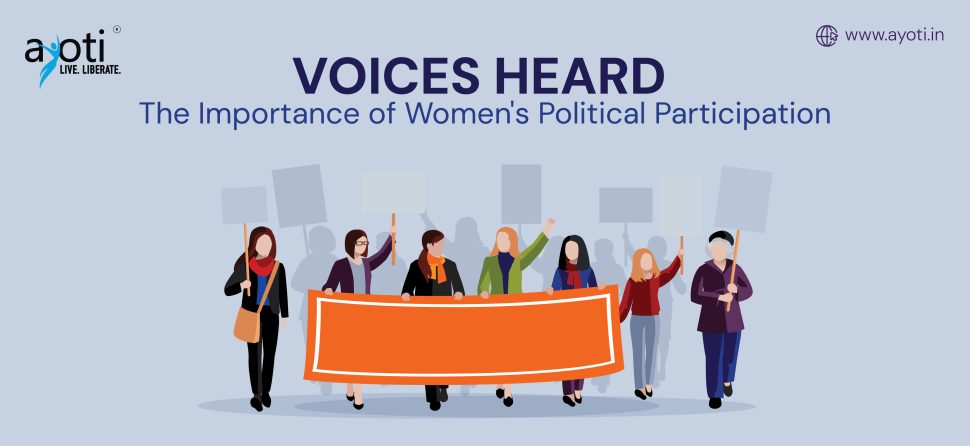By ayoti
Voices Heard: The Importance of Women’s Political Participation
Political decisions in many parts of the world had become unbalanced, with men being dominant over women. This created a number of imbalanced perspectives that often overlooked and ignored critical issues they directly affected. Yet, with the ongoing empowerment of women in every sphere of influence, one of the crucial areas where their voices needed recognition and value was in politics. Women cannot be absent in political spaces, as it is important for a balanced democracy and prioritization of policies that could lead to overall improvements in society.
Why Women’s Political Participation Matters
- Balanced Representation
Governments are supposed to represent all their citizens, though historically, they have only represented a portion of the population. Women in politics bring experiences and insights that differ from men’s. This diversity is very helpful in addressing policies that need perspectives from all demographics, such as health, education, and family welfare, which disproportionately affect women.
- Policy Priorities Reflect Real Needs
Women leaders are most likely to advocate for causes that directly affect families and communities, such as childcare, maternity leave, health care, and education. Studies indicate that women in legislatures tend to prioritize social welfare programs, equal economic treatment, and protections against domestic violence. These critical issues will mean something when women participate in political decision-making.
- Empower the Next Generation
As women’s visibility in politics increases, it enables young girls and women all over the world to become role models and shape the career goals of future leadership. If young people view women in influential positions and the power seats, they will believe that roles are accessible to them as well. This influence shapes present and future generations, paving the way towards greater gender equity.
- Enhancing Governance and Transparency
The number of women in government is positively associated with lower levels of corruption. Female leaders tend to accentuate transparency, inclusivity, and community welfare that guarantee good governance. Their presence questions and transforms the traditional masculine dominance in political domains, translating into a quest for accountability and service.
Obstacles to Women’s Political Involvement
- Cultural and Social Norms
As many societies associate politics with a male domain, it can be discouraging for women, who shy away from entering politics. Women who challenge these norms can also incur backlash, thus making the barrier of entry harder. Society needs to change its perspective in relation to education and normalize the prevalence of women in politics.
- Gender Discrimination and Bias
Women face both overt and covert forms of discrimination in the political sphere. Women politicians are judged based on a completely different yardstick compared to their male colleagues and face more criticism and scrutiny about them. This may add more difficulties for women and may deter them from participating.
- Lack of Access to Resources and Networks
Political campaigns require funding, connections, and mentorship, much of which women often need more access to. Financial constraints and limited political networks further make it difficult for women to start and maintain successful political careers. A better support network can be developed to raise the funding allocated specifically for women in politics to narrow the gap.
- Balancing Family and Public Life
Even a political career can be difficult for women who have families. One problem is that society puts a heavy burden on prioritizing family duties over public life. The “double burden” may deter women from entering politics, mainly where policies such as parental leave or care support are not in place.
Strategies to Foster Women’s Participation in Politics
- Education and Building Awareness
Education is a powerful tool for transformation. Schools and community-based programs should advocate for women and girls to achieve gender equality and lead kids toward civic engagement and prominent leadership positions.
Curriculum programs on political awareness can also educate women and empower them with the knowledge and confidence to interact with people and politics.
- Stronger networks
A political party, government, and non-profit can ensure women’s advancement by setting up a mentorship program, networking opportunities, or resources for building political skills. Mentorship is of great importance, and it offers guidance, advice, and support for coping with the challenges in politics women often face.
- Gender Quotas and Policies Implementation
Some countries have used gender quotas to ensure a minimum level of women’s representation in government. Quotas have worked effectively in numerous countries as a necessary step in boosting women’s political participation. They are certainly not a long-term solution but can be a temporary step toward achieving gender balance and motivating other women to step forward.
- Encourage an Inclusive Work Environment
Inclusiveness, family-friendliness, and no harassment or discrimination are essential for political workplaces. Balancing work life with family life, parental leave, and flexible work policies is extremely important in political workplaces that would attract and retain more women.
The Impact of Women’s Political Participation
The comprehensive impact of women’s political participation extends beyond the direct policy they advocate. Women participating in government contributes to peace, equality, and justice- a more cohesive and fair society. Evidence also shows that increased numbers of representatives at all levels enhance investment in education, health, and social services, which are key drivers of economic growth and stability.
They act as a bridge between different communities and incite cooperation and discussion. Their approach to solving problems is collective, but it works more effectively for society’s well-being and is sustainable.
Conclusion
Women’s involvement in politics is seriously important. Once women are granted equal footing on political orders, stronger, more inclusive, and equitable societies are built. It’s time to break down walls and create an enabling environment where women are encouraged and supported to strive and thrive in politics. Everyone has a voice to be heard in a balanced government, and every woman’s voice is important for the success of democracy. In this regard, communities can be empowered to build sustainable change, meeting the needs of all citizens. Only when women take their rightful place in political life can we build societies reflecting humanity’s wide variety, strength, and potential?





